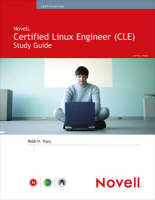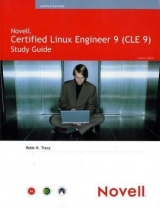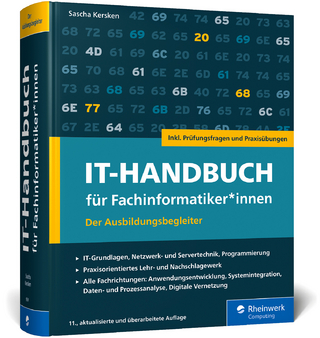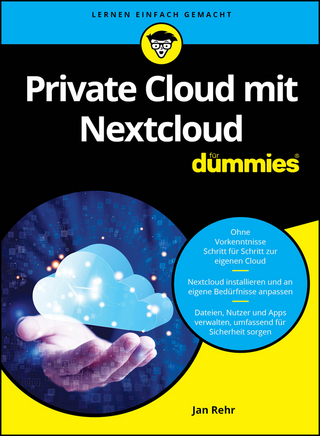
Novell Certified Linux Engineer (Novell CLE) Study Guide
Que Corporation,U.S. (Verlag)
978-0-7897-3203-3 (ISBN)
- Titel erscheint in neuer Auflage
- Artikel merken
The Novell CLE Study Guide, the official study guide to Novell's Certified Linux Engineer (CLE) exam, meets the needs of those seeking to pass the Novell Certified Linux Engineer exam. The Novell CLE Study Guide provides deeper coverage of Nterprise Services for Linux components than any other documentation and the knowledge needed to pass the practical exam with coverage of the Novell Nterprise Linux Services (NNLS) using hands-on labs and scenarios.
With 10 years of teaching experience, Robb H. Tracy is an expert in the information technology training industry. He has a Master of Science degree in Instructional Technology from Utah State University. There he learned the principles of teaching and learning from some of the finest minds in the field. Since leaving the university, Tracy has designed and implemented technical training curriculums for major industry hardware and software vendors since 1994. He spent some time working for Novell, Inc. in the 1990s, developing courseware for all CNE training programs since NetWare 4.11. He has also served on the CompTIA Network+ certification committee.
Introduction.
1. Introduction to the CLE Practical Exam.
Introduction to the CLE.
Novell Nterprise Linux Services.
Why CLE?
Who Is the CLE For?
CLE Objectives.
Using This Study Guide.
Introduction to the CLE Test Environment.
Why Practical Exams Are Used.
How the CLE Practicum Works.
CLE Practicum Tips and Strategies.
Read the Scenario.
Plan Your Strategy.
Implement Your Plan.
Test the Resolution.
Summary.
2. Introduction to SUSE Linux.
An Overview of Linux.
A Historical Review of Linux.
About GNU.
Linux Distributions.
The Function of Linux in a Computer System.
Introduction to the Linux User Interface.
An Introduction to the Linux File System.
Introduction to Linux Users.
Lab Exercise 2.1: Installing a New SUSE Linux Server.
Working with the Linux Command Line.
Linux Shells.
Using Linux Commands from the Command Line.
Commonly Used Linux Commands.
Lab Exercise 2.2: Using the Linux Command Line.
Working with the Linux File System.
Default Linux File System Structure.
Command-Line File System Utilities.
Using the mount Command.
Managing Archive Files.
Editing Text Files.
Lab Exercise 2.3: Managing Linux Files and Directories.
Answers to Exercises.
Lab Exercise 2.2.
Lab Exercise 2.3.
Summary.
3. Linux Administration and Configuration.
Managing Linux Users and Groups.
Linux File System Security.
Managing File Ownership and Permissions.
File Ownership.
File Permissions.
Lab Exercise 3.1: Managing Linux Security.
Managing the Linux Networking Configuration.
Linux Network Interfaces.
Managing Linux Network Interfaces with ifconfig.
Configuring Linux Network Interfaces in YaST.
Managing Linux Applications and Services.
Installing Linux Packages.
Managing Linux Services.
Managing Linux Processes.
Lab Exercise 3.2: Installing Linux Products and Managing Processes.
Implementing and Configuring NTP.
Why Time Must Be Synchronized.
Lab Exercise 3.3: Implementing NTP.
Summary.
4. Introduction to Novell Nterprise Linux Services (NNLS).
Introduction to NNLS.
What Is NNLS?
NNLS Components.
Identity Management.
File Management.
Print Management.
Messaging Services.
Collaboration Services.
Version Management Services.
Web-based Administration.
Novell and Open Source.
Summary.
5. NNLS Installation and Administration.
Installing NNLS.
Getting Ready to Install NNLS.
Lab Exercise 5.1: Installing and Configuring SLP.
Installing NNLS.
Lab Exercise 5.2: Preparing to Install NNLS.
Lab Exercise 5.3: Installing NNLS.
Updating NNLS with Red Carpet.
Components That Comprise Red Carpet.
Configuring Red Carpet.
Lab Exercise 5.4: Updating NNLS with rcd.
Managing eDirectory.
What Is a Directory Anyway?
How eDirectory Works.
Lab Exercise 5.5: Managing eDirectory.
eDirectory and LDAP.
Equating eDirectory and LDAP Terms.
eDirectory LDAP Integration.
LDAP Binds to eDirectory.
LDAP Data Interchange Format (LDIF).
Lab Exercise 5.6: Importing an LDIF File.
Administering eDirectory on Linux.
Command-line Utilities.
Using iManager.
Using iMonitor.
Summary.
6. Managing User Accounts with eGuide and Linux User Management.
Working with eGuide.
How eGuide Works.
Managing eGuide.
Lab Exercise 6.1: Working with eGuide.
Working with Linux User Management.
How LUM Works with eDirectory.
How LUM Redirection Works.
Setting Up LUM.
Lab Exercise 6.2: Implementing LUM.
Summary.
7. Synchronizing User Identities with DirXML.
An Introduction to DirXML.
How DirXML Works.
DirXML Components.
DirXML Filters and Rules.
Transformation Stylesheets.
Changes Made to the System After DirXML Is Installed.
DirXML Starter Pack Drivers.
DirXML Objects Added to Your Tree.
Installing and Configuring the DirXML Delimited Text Driver.
Implementing the Delimited Text Driver.
Configuring the Delimited Text Driver.
Lab Exercise 7.1: Working with the DirXML Delimited Text Driver.
Lab Exercise 7.2: Testing the DirXML Delimited Text Driver.
Installing and Configuring the DirXML eDirectory Driver.
About the DirXML eDirectory Driver.
Configuring the eDirectory Driver.
Lab Exercise 7.3: Working with the DirXML eDirectory Driver.
Summary.
8. Implementing File Services with iFolder, Samba, and NetStorage.
An Introduction to iFolder.
How iFolder Works.
How iFolder Authentication Works.
Synchronizing Files with iFolder.
Installing and Configuring iFolder.
Installing iFolder.
Configuring and Managing iFolder.
Lab Exercise 8.1: Implementing iFolder.
An Introduction to Samba.
Samba Protocols.
Samba in NNLS.
Installing and Configuring Samba.
Installing Samba.
Configuring Samba.
Lab Exercise 8.2: Implementing Samba.
An Introduction to NetStorage.
The Function of NetStorage.
NetStorage Storage Locations.
Configuring NetStorage.
Installing NetStorage.
Configuring NetStorage.
Lab Exercise 8.3: Working with NetStorage.
Summary.
9. Implementing Print Services with iPrint.
An Introduction to iPrint.
iPrint Components and Functionality.
Installing and Configuring iPrint.
Installing the iPrint Service.
Installing the iPrint Client.
Configuring iPrint.
Configuring iPrint Printers on Windows Workstations.
Lab Exercise 9.1: Implementing iPrint.
Lab Exercise 9.2: Implementing Location-Based Printing.
Summary.
10. Implementing Email Services with NetMail.
An Introduction to NetMail.
NetMail Features and Benefits.
NetMail Components.
NetMail Directories in the File System.
Using WebAdmin.
NetMail Message Processing.
Designing, Installing, and Configuring NetMail.
Planning Your NetMail Deployment.
Installing NetMail.
Configuring NetMail.
Lab Exercise 10.1: Implementing NetMail.
Summary.
11. Tying It All Together with Virtual Office.
An Introduction to Virtual Office.
Installing Virtual Office.
Configuring Virtual Office Parameters.
Configuring Services Administration Settings.
Configuring the Virtual Office Environment.
Configuring Virtual Teams.
Lab Exercise 11.1: Configuring Virtual Office.
Summary.
12. CLE Practice Scenario.
CLE Exam Objectives.
Business Requirements Document for InfoTec, Inc.
About InfoTec, Inc..
Summary.
Index.
| Erscheint lt. Verlag | 13.10.2004 |
|---|---|
| Zusatzinfo | Illustrations, port. |
| Sprache | englisch |
| Themenwelt | Mathematik / Informatik ► Informatik ► Betriebssysteme / Server |
| ISBN-10 | 0-7897-3203-3 / 0789732033 |
| ISBN-13 | 978-0-7897-3203-3 / 9780789732033 |
| Zustand | Neuware |
| Haben Sie eine Frage zum Produkt? |
aus dem Bereich



